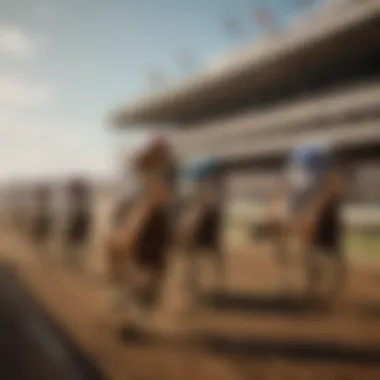The Thriving Racetrack Casino Scene in New Orleans


Intro
New Orleans isn’t merely known for its jazz, gumbo, or Mardi Gras; it also boasts a captivating racetrack casino scene that blends the thrill of horse racing with the excitement of casino gaming. This city has a history steeped in both these pastimes, making it a prime destination for gambling enthusiasts. Walking through the gates of a racetrack casino here is like stepping into a lively mosaic—you can hear the galloping of horses, see the flashing lights of slot machines, and feel the buzz of hopeful bettors.
The evolution of racetrack casinos in New Orleans is not just a tale of entertainment, but also a reflection of broader socio-economic currents. Over the years, these venues have transformed from simple racetracks to vibrant hubs where gaming and racing coexist. With such a rich backdrop, this article will provide insights into not only the history and development of these casinos but also delve into playing strategies, responsible gambling practices, and how they impact the local community. Whether you’re a seasoned pro or someone just dipping a toe into these waters, understanding this landscape is essential for making the most of your experience.
In the following sections, we will explore the nitty-gritty of racetrack casinos, starting with game strategies and tips that can enhance your betting experience.
Preface to Racetrack Casinos
Racetrack casinos hold a unique position in the broader gambling landscape, especially in vibrant locales like New Orleans. This multifaceted nexus between horse racing and casino gaming brings together enthusiasts of various stripes, from avid racers to poker players and strategic bettors. The establishment of racetrack casinos transcends mere entertainment; they are dynamic venues contributing to local economies, cultural events, and social interactions among communities.
The importance of understanding racetrack casinos lies not only in their entertainment value but also in their historical and cultural significance within New Orleans. These facilities offer a one-of-a-kind experience, as they meld the thrill of live racing with the excitement of casino-style gaming. As such, an exploration of this landscape provides valuable insights into the evolution of betting practices, regulatory frameworks, and the economic impact these establishments have on their surroundings.
Definition and Concept
Racetrack casinos can be described as venues that combine live horse racing with various gaming options, predominantly slot machines and table games. These establishments operate under specific regulations that allow them to offer a phalanx of betting activities beyond traditional racetrack wagering. The very essence lies in blending the high-paced excitement of racing with the diverse array of games found in casino settings.
This duality sets racetrack casinos apart from regular casinos as they often feature live racing events that attract guests, driving foot traffic and interest in the gaming options available. Furthermore, it offers gamblers a unique event-driven atmosphere where the adrenaline of race day complements the chance to partake in casino gaming before, during, and after events.
Historical Context in New Orleans
In New Orleans, the inception of racetrack casinos is rooted in a rich tapestry of cultural and legislative evolution. The origins date back to the early 20th century when horse racing became a popular pastime, firmly embedded in the local social fabric. The Fair Grounds Race Course, established in 1852, is one of the oldest venues in the area, which eventually transitioned into a hybrid racetrack casino with the changing legal landscape.
This shift began gaining traction in the 1990s when lawmakers recognized the potential economic benefits of legalized gaming. The passage of legislation legalizing riverboat gaming and later racetrack casinos opened the floodgates for expansion in the racing and gaming sectors. Such legal developments not only boosted tourism and local economies but also positioned New Orleans as a significant player in the gaming industry.
This historical context helps illuminate the evolution and integration of racetrack casinos within the city’s lifestyle, revealing the interplay between local culture, legislative change, and economic vitality. Understanding this history is crucial for grasping how the current racetrack casino landscape has been shaped and how it may evolve in the future.
The Evolution of Racing and Gaming
The racetrack casino landscape in New Orleans mirrors a historical journey filled with evolution and transformation. Understanding this evolution is crucial not only for enthusiasts but also for anyone interested in the broader impacts of such integrations on culture, economy, and regulation.
From Traditional Racing to Casino Integration
In earlier days, horse racing stood on its own as a well-loved pastime, drawing locals and tourists alike to its thrilling spectacle. The excitement of a race, where jockeys and horses battled it out on the turf, was often enough to keep people coming back. Yet, as time went on, a different kind of thrill began to grow—one that enveloped the concept of integrated gaming. Racetracks started to realize that attaching a casino to their operations wasn’t just a matter of boosting revenue; it was about crafting a holistic entertainment experience.
Imagine the buzz of race day combined with the energetic atmosphere of slot machines and table games. This transition offers more than just diversifying income streams; it’s about creating a vibrant space where the two worlds can engage. Visitors might stroll from placing a wager on a horse they’ve come to know to trying their luck at a roulette table. This interconnectedness not only attracts a wider demographic but encourages longer visits and increased spending.
Moreover, with the rise of casino gaming, racetracks have had to adapt to changing consumer preferences, offering amenities that go beyond the races. Restaurant options, lavish lounges, and live entertainment now accompany the betting windows, changing the way people perceive a day at the races.
> "By integrating gaming with traditional racing, venues are not just adapting but are indeed redefining the entire entertainment experience, turning a simple race into an all-day event."
Legal Milestones in Louisiana
Louisiana’s racing and gaming regulations have undergone significant changes over the years, shaping the current landscape in which racetrack casinos operate. Understanding these legal milestones is essential for gamblers and operators alike.
The legalization of slot machines at racetracks in the late 1990s marked a turning point. It was a bold move that acknowledges the crossing paths of horse racing and casino gaming in a way that had never been seen before. From that juncture, racetracks began to flourish as full-service gaming establishments rather than just venues for horse racing.
In the following years, enhanced regulations were introduced to ensure compliance and fairness in gaming practices. This transition included efforts to regulate online betting, which, although still a work in progress, reflects a significant shift in how individuals engage with racing and gaming. The careful structuring of these regulations not only impacts revenue but also restores community trust, ensuring that the environment remains safe and competitive.
It is also essential to note that recent years have brought discussions about expanding sports betting, a notion that carries its own set of challenges and opportunities. The landscape in Louisiana continues to evolve, not just in terms of the games available but also in how communities deal with the complexities of modern gambling.
In summary, the evolution of racing and gaming within New Orleans is a testament to the dynamic interplay between tradition and innovation. The journey has altered perceptions and changed how people interact with both horse racing and casino gaming, creating a more integrated and diverse entertainment ecosystem.
Key Racetrack Casino Venues in New Orleans
When we talk about racetrack casinos, we dive into an intriguing intersection of culture, entertainment, and economics. These venues aren’t just places for placing bets and enjoying the thrill of the race; they’re vital for the local communities they inhabit. Mind you, they splice together the adrenaline of horse racing with the excitement of gaming, creating a unique environment that draws both locals and tourists. Through understanding the significance of the key venues, one gets a sense of how they contribute to the very fabric of New Orleans’ vibrant lifestyle.
Overview of Popular Venues


New Orleans boasts several prominent racetrack casinos, each one bringing its own flavor to the gaming scene. Places like Fair Grounds Race Course and Louisiana Downs serve not only as venues for racing but also as full-fledged entertainment hubs. Visitors can watch a race under a canopy of Louisiana sun, while also indulging in dining options that rival even the finest restaurants in the area. The hospitality of these venues plays a key role in enhancing the experience, providing patrons with a taste of local culture intertwined with the thrill of the races.
Some popular venues include:
- Fair Grounds Race Course: Historical significance; various racing events year-round.
- Louisiana Downs: Notable for quarter horse racing and slot machines.
- Smaller tracks like Delta Downs and Evangeline Downs, each adding diversity to the racing calendar.
This variety ensures there’s always something happening, catering to diverse tastes and preferences that gamblers and racing enthusiasts hold dear.
Featured Venue: Fair Grounds Race Course
One of the crown jewels in New Orleans’ racetrack scene is undoubtedly the Fair Grounds Race Course. It's rich in history dating back to 1872. More than just an establishment for horse racing, its significance lies in the cultural events it hosts. Known for its main racing season, which aligns with the heart of New Orleans’ social calendar, the Fair Grounds offers a turf course that attracts some serious racing talent.
The venue isn’t merely about betting. Visitors often find themselves enticed by the unique cuisine offered - from jambalaya to beignets - making it a truly multisensory experience. You can enjoy a race while savoring a traditional gumbo, blending the love for food with the thrill of the track. Besides the main races, it also features numerous events throughout the year, such as concert series and local festivals, fostering a sense of community.
Featured Venue: Louisiana Downs
Louisiana Downs stands out as another key player in the racetrack casino landscape. Located in Bossier City, this venue combines a spacious racing area with a casino that’s been attracting gaming enthusiasts since its inception. What many might find captivating is its focus on quarter horse racing, which lends a different pace to the traditional long-distance races you’d see elsewhere.
The casino aspect at Louisiana Downs shouldn’t be overlooked; it houses a variety of electronic gaming options, including slot machines and video poker that keep the adrenaline pumping between races. It's particularly vibrant during event days, where both racing and gaming unite. The blend of exciting promotions and themed events also captures the attention of guests seeking both thrill and entertainment.
In essence, both Fair Grounds and Louisiana Downs manifest the spirit of New Orleans, intertwining racing heritage with community culture, making them not just venues, but cherished institutions that illustrate the richness of the city’s entertainment landscape.
Gaming Options at Racetrack Casinos
When one thinks of racetrack casinos, the mind often drifts to the thundering hooves of horses racing down the track or the allure of slot machines chiming in delight. In New Orleans, the gaming options at racetrack casinos offer a rich tapestry that caters to a variety of preferences, blending traditional horse racing with modern gaming experiences. This section delves into the nuances of these gaming options and their significance in the broader landscape of gambling in the city.
Types of Games Offered
Racetrack casinos in New Orleans do not merely function as a hub for horse racing; they offer a diverse mix of gaming options that keep both casual gamblers and seasoned players entertained. Here’s a closer look at the types of games available:
- Slot Machines: The flashing lights and spinning reels of slot machines pull in many visitors. Various themes captivate different demographics—from the classic fruit machines to modern, elaborate video slots.
- Table Games: For those who thrive in a more interactive environment, table games like blackjack, roulette, and poker are mainstays. Players can enjoy classic games or variations that make their experience unique.
- Electronic Gaming: Many casinos offer electronic versions of traditional games. These machines provide the mechanics of games like poker and blackjack with the fast pace and convenience of technology.
- Live Poker Tournaments: A true gambler’s delight, the live poker rooms allow players to pit their strategies against one another in exciting tournaments, building a palpable atmosphere of competition.
Given this diverse array, it becomes clear why racetrack casinos are more than just a place for horse racing; they embody a multifaceted gaming experience, enriched by the local culture and vibrant atmosphere of New Orleans.
Horse Racing Betting Systems
Horse racing is the heartbeat of racetrack casinos, and the betting systems surrounding it cleverly blend strategy with excitement. Understanding these systems can enhance the gambling experience for both novice and expert bettors. Here are some prominent betting options:
- Win, Place, Show: The most straightforward bets where a wager is placed on a horse to win, to place (finish in the top two), or to show (finish in the top three).
- Exacta and Quinella: These bets require predicting which horses will finish in the top positions. An Exacta bet needs the horses to finish in the exact order, while a Quinella allows them to finish in any order.
- Trifecta and Superfecta: More advanced betting systems where a bettor selects three or four horses to finish in a specific order. Successfully predicting these outcomes can lead to substantial payouts.
- Daily Doubles and Pick 3/4/6: These wagers require a bettor to select winners in consecutive races, increasing both the thrill and challenge.
“Understanding these betting systems is essential. They not only add to the thrill of the game but also empower gamblers to make informed decisions.”
Regulatory Framework Governing Racetrack Casinos
The regulatory framework governing racetrack casinos is a pivotal aspect in understanding the dynamics of betting and gaming in New Orleans. This landscape is influenced heavily by both state laws and local regulations, which serve to ensure fairness, transparency, and accountability in gaming operations. The significance of these regulations cannot be understated, as they affect how casinos operate, the safety of bettors, and the overall economic contribution to the community.
State Regulations and Compliance
State regulations provide a legal structure within which racetrack casinos must operate. In Louisiana, the regulatory body overseeing these casinos is the Louisiana Gaming Control Board. This organization is responsible for enforcing state laws regarding gambling, ensuring that operators are in compliance, and safeguarding the interests of the public.
Compliance involves several key elements, such as:
- Licensing: All racetrack casinos must obtain proper licenses, which require extensive background checks, financial disclosures, and adherence to operational standards.
- Monitoring: Regular audits and checks help maintain compliance, ensuring that casinos follow the law and operate fairly.
- Player Protections: Regulations stipulate measures that casinos must implement to protect the welfare of gamblers, particularly concerning responsible gambling practices.
Violation of these regulations can incur hefty fines or lead to the loss of a casino's operating license, making adherence a primary concern for these establishments.
Impact of Regulation on Operations
The regulations set by the state have a profound impact on the operations of racetrack casinos. These rules not only dictate how casinos manage their gaming offerings but also influence the economic environment surrounding them. For instance,
- Economic Contributions: Well-regulated casinos often report better economic performance due to increased trust from patrons. When players feel safe and secure in their gambling environment, they are more likely to participate actively, thereby boosting local revenue through gaming taxes.
- Innovation and Competition: Regulations can spur innovation in the gaming sector, as casinos strive to create unique offerings within the legal confines of the law. As competition intensifies, racetrack casinos may enhance their gaming experiences with innovative technology or attractive promotions, all of which fall under the watchful eye of regulatory bodies.
- Public Relations: Successful compliance with regulations can serve as a public relations tool, helping casinos build a positive image in the communities where they operate. This is essential for attracting tourists and maintaining a loyal local client base.


In summary, the regulatory framework not only protects the integrity of gaming but also shapes the economic landscape of racetrack casinos, making it an essential topic of study for anyone interested in the gaming industry in New Orleans.
Economic Impact of Racetrack Casinos
Racetrack casinos in New Orleans don't just serve as entertainment venues; they are also vital arteries of the local economy. The influence of these establishments reaches far and wide, touching various aspects of the community. It's not merely about the bright lights and the thrill of the race, but rather how these sites are intertwined with economic health and sustainability. In this section, we will delve into the significant contributions racetrack casinos make to the local economy, and how their presence fosters job growth and economic vibrancy.
Contribution to Local Economy
Racetrack casinos generate substantial revenue that permeates through the New Orleans local economy. The taxes collected from these venues bolster public resources, funding education, infrastructure, and public health initiatives. This financial infusion often goes unnoticed, yet it is pivotal in maintaining and enhancing the livability of the city.
- Tax Revenue: The tax contributions from racetrack casinos are not small change. These funds help support local schools, roads, and public services, making them essential for overall community well-being.
- Place in Tourism: New Orleans is famous for its vibrant culture, and racetrack casinos play a significant role in attracting tourists. Visitors flock to see horse races and games, thus enriching the local hospitality sector from hotels to restaurants.
- Supplier Partnerships: Many racetrack casinos collaborate with local suppliers, creating a ripple effect of economic activity. The demand sustains numerous local businesses, from food vendors to maintenance services, enhancing the economic tapestry of the region.
In short, the contribution of racetrack casinos extends well beyond their walls, benefiting the entire community in profound ways.
Job Creation in the Casino Industry
One cannot discuss the economic impact of racetrack casinos in New Orleans without mentioning the jobs created. Employment opportunities generated by these establishments offer not just positions but also career paths for many locals. From entry-level jobs to high-skilled management roles, the job market is indeed diversifying thanks to the gaming industry.
- Direct Employment: Racetrack casinos provide thousands of jobs ranging from dealers to hospitality staff. These roles are essential and contribute to lowering local unemployment rates.
- Skill Development: Many of these jobs require specific training and skills. This need has led to the creation of programs aimed at training and employing local residents, allowing them to gain valuable experience in the workforce.
- Support for Ancillary Jobs: The presence of casinos also leads to the emergence of related industries. Think about maintenance workers, event coordinators, and marketing specialists. When you add in the indirect roles that support and benefit from casino operations, the number rises significantly.
In summary, the job creation ripple effect from racetrack casinos encompasses the replacement of lost jobs and paving new paths for economic prosperity. From revitalizing neighborhoods to giving families sustainable income, racetrack casinos signify much more than just gaming—they symbolize opportunity for many.
"The business of racetrack casinos serves as a catalyst for the economic engine in New Orleans, intertwining entertainment with opportunity."
Cultural Significance of Racing and Gaming
The cultural landscape of New Orleans is like a rich gumbo, stirred with diverse flavors, intertwining traditions, and spirited events. At the heart of it are the racetrack and gaming phenomena, which do not merely serve as leisurely activities but echo the vibrant history and identity of the city. This section will dive into how racing traditions breathe life into New Orleans' unique culture and how gaming intertwines seamlessly with local festivities and gatherings.
Racing Traditions in New Orleans
Racing isn't just a pastime here; it is a piece of the social fabric that has been stitched together over centuries. The Fair Grounds Race Course, one of the oldest racetracks in the U.S., is a prime example. Opened in 1852, it has since become a habitat for horse racing in the area, showcasing not just equine talent but also embodying local pride. People come together—jokers, dreamers, and thinkers—to witness the races while donning their best hats.
Racing events often merge with New Orleans' lively spirit. During Mardi Gras, for instance, you might catch a horse race before the parades roll out. This coupling of traditions emphasizes that horse racing isn't only about the sport; it's about community. The excitement is palpable, with friends yelling at their favorites as they cheer over frosty drinks.
Moreover, locals embrace horse racing through various betting strategies specific to the region. Many have engaging stories of winning a dime and turning it into a treasure or losing a bet and sharing the tales of their ‘bad luck’ over a plate of jambalaya. These narratives enrich communal ties and keep racing traditions alive.
Impact on Local Events and Festivals
Racetrack casinos in New Orleans play an instrumental role in shaping local events and festivals. The Kentucky Derby, for example, draws a crowd in early May, where the city comes alive with themed parties and festivities. It’s an occasion where neighborhoods gather, dress alike, and celebrate not just the event but their connections to one another.
The link between events like these and the cultural significance of racing isn’t a coincidence. Festivals such as the Jazz & Heritage Festival often feature racing exhibitors, educating attendees on bet types, strategies, and the history of the sport. This blend of racing with musical heritage highlights how integral it is to the New Orleans experience.
"In New Orleans, every race is a reason to celebrate, to gather, and to share the thrill of what could be with those you hold dear.”
Racetrack casinos also host community-oriented events. They invite local musicians to perform during race days or include food trucks serving up mouthwatering magnolias. This eclectic mix breathes life into the community, allowing them to partake in something greater.
In summation, racing traditions and gaming in New Orleans are more than mere entertainment. They are the pulse of the community, driving cultural festivities and crafting a unique bond among residents and visitors alike, giving them shared memories and experiences.
Challenges Facing Racetrack Casinos
As the gambling landscape evolves, the challenges confronting racetrack casinos in New Orleans have become increasingly complex. Recognizing these hurdles is essential not only for understanding the current state of the racetrack casino industry but also for anticipating its future trajectory. The interaction between traditional gaming operations and modern challenges is significant and has implications for laymen and enthusiasts alike. Addressing these challenges can offer insights into potential innovations and adaptations within the sector.
Competition from Online Gaming
With the rise of digital platforms, ^racing casinos^ face mounting pressure from online gaming websites. These platforms provide convenience that physical venues struggle to match. Gamblers can place bets from anywhere, which has made it easier than ever for players to find and engage with various forms of gambling.
- Accessibility: One of the primary advantages of online gaming is its ease of access. Players can log in at any time, eliminating the need to travel to physical casinos. This has caused a notable shift in gambling habits, especially among younger demographics who prefer mobile devices over traditional venues.
- Extended Offerings: Online gaming often features a broader range of games that draw in players. While racetrack casinos may specialize in horse racing and specific table games, online casinos showcase diverse options, from slots to poker tournaments. This larger selection can make physical venues appear limited in comparison.
- Financial Incentives: Many online casinos offer attractive bonuses, promotions, and loyalty programs that can’t be easily replicated at racetrack casinos. Free play and other incentives lure players away, making traditional casinos feel less competitive.
"The landscape has shifted dramatically; we can’t afford to ignore the online element any longer."
In response, racetrack casinos are exploring partnerships with online platforms and enhancing their own digital offerings. This could bridge the gap between the traditional experience and the convenience of online gambling, potentially attracting a broader audience.


Economic Fluctuations and Impact on Revenue
Economic volatility poses another significant challenge for racetrack casinos. They are susceptible to shifts in disposable income that influence gambling behaviors. Slumps in the economy often lead to reduced revenues as customers are less willing to spend on leisure activities like gambling.
- Consumer Spending: When economic downturns occur, discretionary spending often diminishes. This directly impacts racetrack casinos since they rely on customers’ willingness to engage in gaming activities. Regular patrons may cut back on spending, resulting in significant financial strain.
- Operational Costs: On the flip side, racetrack casinos have to manage their own operational costs. Rent, maintenance, staffing, and regulations incur high overheads. In times of economic hardship, reducing these costs while maintaining quality service becomes a balancing act.
- Strategic Adjustments: To weather these storms, racetrack casinos might need to adapt their operational strategies. This could involve diversifying entertainment offerings beyond just racing and gaming, perhaps incorporating live music or food festivals that draw in crowds while keeping them engaged with other activities.
Responsible Gambling Practices
Responsible gambling is crucial within the context of racetrack casinos, particularly in a vibrant city like New Orleans, where gaming is a significant attraction. The concept revolves around making gambling an enjoyable activity while ensuring it does not lead to addiction or negative consequences for individuals or their families. Recognizing the potential risks associated with gambling is pivotal, and promoting responsible practices can significantly enhance the experience for all involved.
Promoting Responsible Gaming
Racetrack casinos in New Orleans actively engage with patrons to foster a culture of responsible gaming. They frequently host awareness campaigns that educate gamblers about the risks of excessive gaming. Here are some common promotional strategies:
- Information Sessions: These sessions focus on educating consumers about betting odds, game probabilities, and the possible risks of gambling. It's important that participants grasp how the games work and how easy it can be to lose track of spending.
- Self-Exclusion Programs: Many venues offer programs enabling individuals to voluntarily restrict their gambling activities. This option ensures that those who feel the need to take a break can do so without stigma or judgment.
- Responsible Gambling Messaging: Clear signage within casinos provides reminders about sticking to budgets and recognizing problem gambling behaviors. This visibility can act as a gentle nudge for players to remain cognizant of their gaming habits.
"Gambling should be a source of entertainment, not a pathway to stress or financial difficulty. A few precautionary measures can help keep it that way."
By encouraging responsible behavior, racetrack casinos contribute to a healthier gaming environment, one that allows enthusiasts to enjoy their experience without adverse repercussions.
Resources for Gamblers
Providing resources to gamblers is an essential part of fostering responsible gaming practices. Here are some valuable resources available to those engaged in gaming at racetracks in New Orleans:
- National Council on Problem Gambling: This organization offers various tools and resources to help individuals recognize problems and seek assistance when needed. Their website includes helplines and guides for self-assessment.
- Local Support Groups: Community organizations in New Orleans host support groups tailored for gamblers and their families. These gatherings provide a safe space to share experiences and discuss challenges related to gambling habits.
- Online Gambling Assessments: Digital platforms typically allow players to take assessments that can gauge their gambling behavior. This helps individuals self-reflect on their habits, pushing them to reconsider their strategies.
- Casino Information Centers: Most racetrack casinos have dedicated staff available to advise players on responsible gambling practices, as well as discussing potential support options.
In summary, promoting and integrating responsible gambling practices into the gaming culture within racetrack casinos is vital. As this form of entertainment continues to evolve, it is imperative that all parties involved treat gambling with respect and awareness.
Future Trends in Racetrack Casino Gaming
The landscape of racetrack casinos is continually morphing, reflecting broader trends in both technology and consumer preferences. Understanding these future trends is vital not only for industry stakeholders but also for gamblers looking to navigate this evolving betting environment. As New Orleans stands at the crossroads of tradition and innovation, it’s essential to examine how these trends will shape the gambling experience.
Technological Innovations
Technological advancements have become the backbone of modern racetrack casinos, making the gaming experience more engaging and accessible. Innovations such as mobile betting apps and virtual reality systems are reshaping how enthusiasts interact with races and gambling. For instance, mobile platforms allow gamblers to place bets from anywhere, ensuring they don’t miss the action just because they’re not at the track. This convenience has opened the doors to a new wave of players who prefer a seamless experience.
Another exciting development is the use of advanced data analytics. Gamblers can now access real-time data on horse performance, track conditions, and even competitor statistics. By leveraging predictive modeling and AI algorithms, players can make more informed decisions, potentially increasing their chances of winning. The dynamic nature of these tools not only heightens the excitement but also creates a sense of empowerment among gamblers.
"Innovation is key to survival in the racing industry; without it, you risk being left behind in the dust."
Changing Demographics of Gamblers
The demographics of gamblers at racetrack casinos are shifting, reflecting broader changes in societal behavior. Historically, the stereotypical gambler has often been male, but recent trends indicate a more diverse audience. Women and younger individuals are increasingly participating in racing and gaming activities, driven by both changing cultural norms and a desire for social engagement.
Racetrack casinos, once perceived as a haven for older generations, are now attracting millennials and Generation Z, many of whom seek a multifaceted entertainment experience. This shift influences not just the types of games offered but also the whole atmosphere of racetrack venues. For instance, venues are beginning to incorporate lounges, bars, and even live music, creating spaces where young people feel comfortable socializing while enjoying their bets.
Moreover, understanding the motivations of this new breed of gambler – including a preference for fast-paced games and social engagement – can lead to significant changes in marketing strategies. As these younger clients demand more interactive experiences, racetrack casinos must adapt their offerings to remain relevant in the competitive landscape.
In summary, the future of racetrack casino gaming in New Orleans is intertwined with technological advancements and a shifting demographic landscape. As these trends unfold, they promise to create richer, more diverse experiences for all gamblers, ensuring that the vibrant culture of racing and gaming continues to thrive.
Closure
The topic of racetrack casinos in New Orleans holds significant importance, as it encompasses a blend of history, culture, and economic dynamics that shape not only the gambling experience but the very fabric of local society. These establishments marry the thrill of horse racing with the allure of casino gaming, contributing to a unique and engaging atmosphere that is both familiar and novel to visitors and locals alike.
Recap of Main Insights
To encapsulate the discussion around New Orleans' racetrack casinos:
- Historical Roots: The integration of horse racing and gaming has deep historical ties in the region, stretching back to when horse racing was a prominent social event.
- Diverse Gaming Options: Racetrack casinos provide a variety of gaming opportunities ranging from traditional slot machines to intricate horse betting systems, catering to diverse gambling preferences.
- Economic Contribution: These venues not only contribute significantly to the local economy through tax revenues but also generate employment, creating jobs that undergird many households in New Orleans.
- Cultural Significance: The presence of racetrack casinos reinforces local traditions and enhances community spirit, as they often host events that draw large crowds.
- Future Outlook: The interplay between technological innovation and changing demographics indicates a transformation in how gamblers engage with racetrack casinos, suggesting that adaptability will be crucial for their continuing success.
"The racetrack casino experience is as rich and layered as New Orleans itself, offering more than a mere chance to win – it reflects the heart of the community."
Final Thoughts on Gaming in New Orleans
Gaming in New Orleans is more than just a pastime; it reflects the city's vibrant character and communal ties. The racetrack casino landscape is poised at a crossroads, where tradition meets innovation. As gambling enthusiasts continue to evolve their preferences, the racetrack casinos must remain agile, adapting to new technologies and evolving demographics. The ongoing dialogue among stakeholders, be it the regulatory bodies, local businesses, or the gamblers themselves, will play a crucial role in shaping this environment.
In summary, the future of gaming in New Orleans, particularly through the lens of racetrack casinos, holds potential ripe with opportunity. It is a space where heritage and modernization coexist, creating a fulfilling experience for both casual visitors and seasoned gamblers. Understanding this dynamic landscape provides valuable insights into not only the games played but the cultural and economic threads that interweave within this unique urban tapestry.



